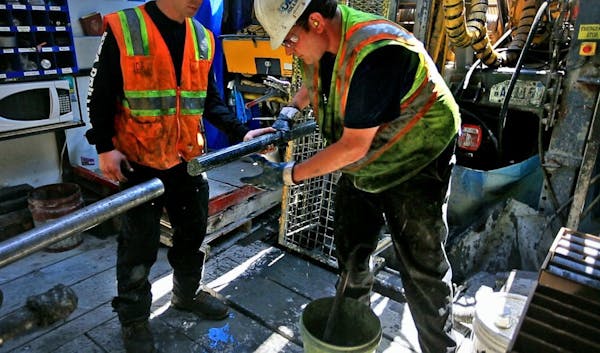Environmentalists have filed a second lawsuit over the U.S. Forest Service's decision to swap forest land with PolyMet Mining, a trade that's crucial for the company's plans to construct an open-pit copper-nickel mine in northern Minnesota.
The lawsuit, filed Monday in federal court, accuses the government of significantly undervaluing the Superior National Forest acreage it has offered to PolyMet, essentially selling the land at a bargain price in violation of federal laws requiring lands exchanged to be of equal value.
Specifically, it accuses the Forest Service of instructing its appraiser to calculate the value of its surface land without considering that PolyMet already controls the mineral rights underneath it — ignoring the parcel's potential value in mining.
The language at issue is contained in May 18, 2015, instructions from the Forest Service to a Wisconsin company called Compass Land Consultants.
Based on the instructions, the appraiser concluded that the highest and best use of the land was for timber, according to the suit, which was filed by the Minnesota Center for Environmental Advocacy, a nonprofit law firm.
In a statement Monday, Kathryn Hoffman, the center's executive director, skewered the trade as a "sweetheart deal for PolyMet."
She called the $550 per acre price "a fraction of the value this land has for PolyMet's mine proposal."
Toronto-based PolyMet has called the exchange "an incredibly important milestone" for its proposed $650 million mining project near Hoyt Lakes, a proposal that has triggered a fierce statewide debate between environmentalists and mining supporters.
The company said Monday it's confident in the Forest Service appraisal: "After years of review and analysis, the Forest Service has determined the land exchange best serves the public's interest."
Other plaintiffs in the new lawsuit are the Center for Biological Diversity and the W.J. McCabe Chapter of the Izaak Walton League of America.
A similar lawsuit over the swap was filed in January by a Minnesota nonprofit called WaterLegacy.
Under the exchange, the U.S. Forest Service would give up 6,650 acres of forest and wetlands near the PolyMet site and essential to its mining operation, in exchange for 6,690 acres of forest acreage in other regions of the Superior National Forest.
The Forest Service reasoned that the public will benefit from the swap because it gets more acres, more wetlands and greater wilderness access, since the existing chunk of parkland is surrounded by mining operations and cut off from easy public access.
The federal land sits at the top of the St. Louis River watershed, which drains into Lake Superior, and is important habitat for the Canada lynx, gray wolf and long-eared bat.
Jennifer Bjorhus • 612-673-4683

Records: Former Minneapolis police oversight head disparaged women, threatened staff
Video goes viral of man enduring 'shocking' chain whipping on downtown St. Paul street
Minnesota sales, clean-ups and other events to celebrate Earth Day and Arbor Day

Marijuana's path to legality in Minnesota: A timeline

